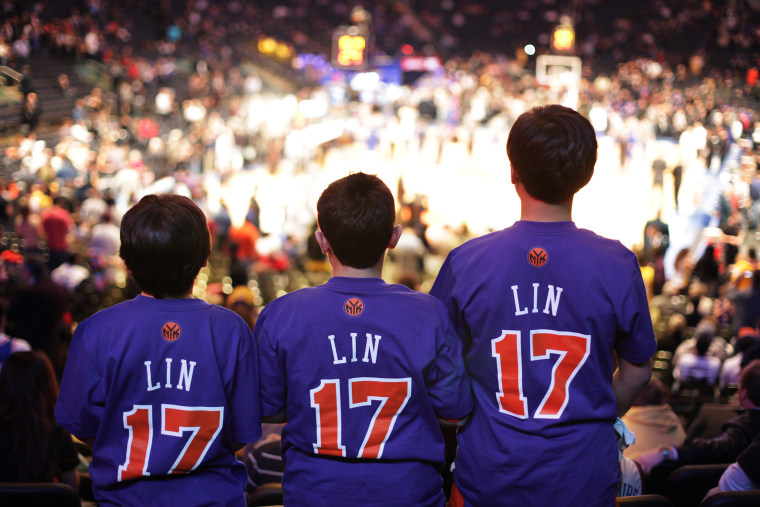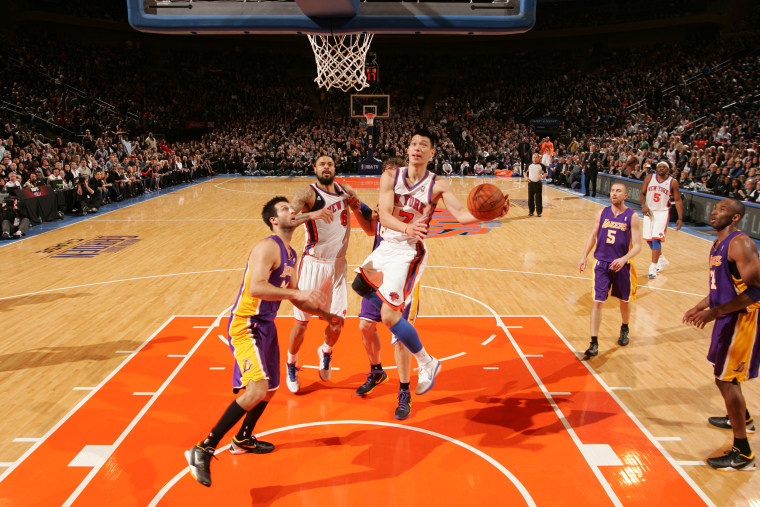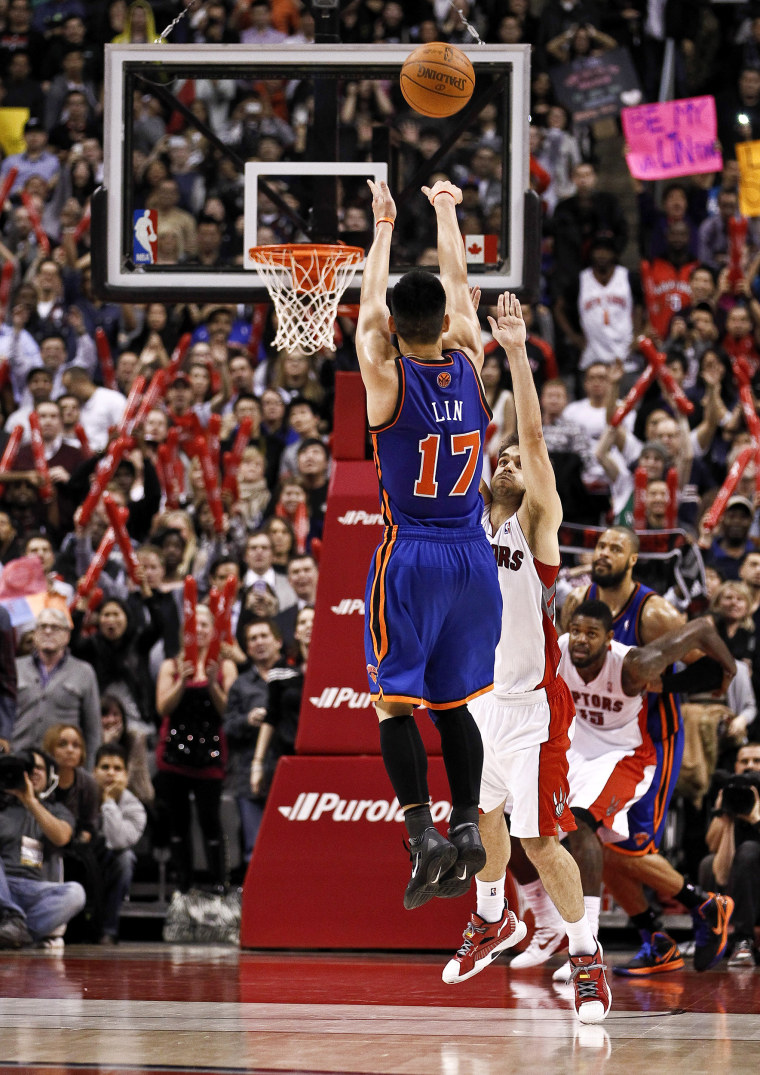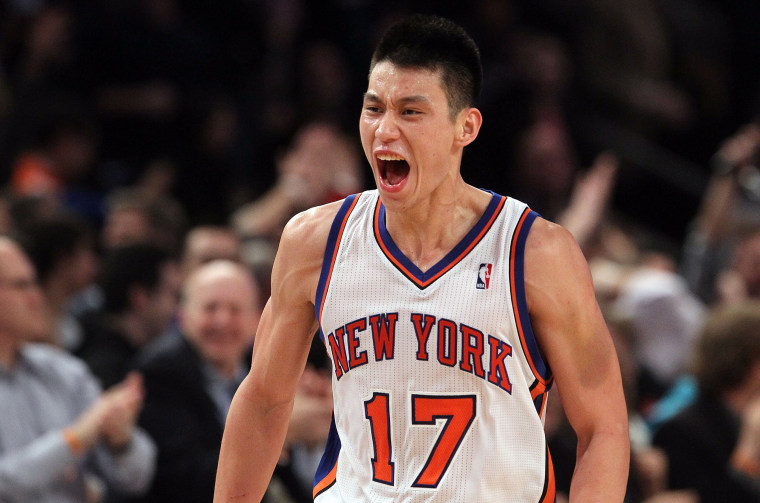"Linsanity": It’s a word that still evokes memories and takes us back to a remarkable moment in time when Jeremy Lin was at the center of the basketball universe. He’d started 2012 barely hanging on to an NBA roster spot; a little over a month later, he was in the New York Knicks’ starting lineup and scoring 38 points against the Lakers — the Lakers! — at Madison Square Garden.
Lin’s rise to superstardom is chronicled in the documentary short “38 at the Garden,” premiering Oct. 11 at 9 p.m. Eastern time on HBO. It hits the highlights, including the Lakers game that gives the film its title, but its true purpose is to explain why Linsanity mattered in 2012, and why it matters in 2022.
For Lin, 34, the timing of the documentary is significant.
“I was sick of talking about Linsanity but I am not sick of talking about the violence against the Asian American community," he told TODAY in a recent Zoom interview. "I’m not sick of talking about how messed up our society is in some ways and how we need to move forward. I’m not sick of talking about the microaggressions, injustices, the uphill battle and the lack of empowerment and equity that a lot of minorities have to deal with."
Though the Linsanity run turned out to be brief, its impact is still felt, particularly among those in the Asian American community.
“When I think back on those moments of Linsanity, everyone was talking about this unknown Asian American player. I long to feel those moments of just pure joy and unity. It was really validating. It was too short-lived, but it did really open a door,” says journalist Lisa Ling, an executive producer of “38 at the Garden,” in the film.
I’m not sick of talking about the microaggressions, injustices, the uphill battle and the lack of empowerment and equity that a lot of minorities have to deal with.
Jeremy Lin
Through interviews with Ling, ESPN’s Pablo Torre and comedians Ronny Chieng, Hasan Minhaj and Jenny Yang, “38 at the Garden” explores how Lin, the first Taiwanese American to play in the NBA, lifted Asians and Asian Americans who have long been subjected to harmful stereotypes and who saw him as evidence that they, too, could chase their dreams. Breaking through in a league that had few players of Asian descent (and continues to have few players of Asian descent), Lin became a powerful symbol of hope.
By calling attention to the surge in hate crimes and bias incidents against the Asian American community in recent years — anti-Asian hate crimes increased by 339% nationwide from 2020 to 2021, according to the Center for the Study of Hate and Extremism — the documentary also illustrates what Lin’s accomplishments have meant beyond the basketball court.

“Maybe the most unifying aspect of the Asian American experience is this desire to be included. It’s to be seen as American, to be counted as one of you. And what Jeremy Lin’s story is is the most visceral example of getting to be a part of a world that had never really had space for you before,” Torre, who is of Filipino descent, says in the film.
“This film is not about me. It’s not about, look at what Jeremy Lin did 10 years ago,” Lin told TODAY. “I hope people walk away from it talking about, how can I be a better person? How can I open and widen my perspective more and how can I be changing the world positively for the next generation?"
A 'back-against-the-wall feeling'
Linsanity is described in almost mythical terms at times in “38 at the Garden”; as Lin himself says in the opening minutes, “There’s no way any of this should have been possible.”
A high school state champion in California and a three-time All-Ivy League player with Harvard, the guard went undrafted by the NBA in 2010 before signing with the Golden State Warriors. After a brief stint with the Houston Rockets in December 2011, he joined the Knicks and seized his chance when given playing time by a team beset by injuries. Lin scored 25 points against the then-New Jersey Nets on Feb. 4, 2012, and then suddenly found himself in the starting lineup.
“I had to prove to everybody that I could do something positive on the court,” Lin told TODAY. “I definitely felt that — like, man, I don’t think my teammates know what I can do. I don’t think my coaches even really know what I can do. I don’t think the fans or my opponents know what I can do. It felt really like, back-against-the-wall feeling.”
Following his breakout performance against the Nets, Lin scored 136 points during a five-game stretch — all wins for the Knicks — that included the 38 points against the Lakers and a game-winning three-pointer against the Toronto Raptors on the road. Lin, a self-described “worrier” who struggles with anxiety to this day, said his faith in God provided him with the confidence to play at a high level.

“To be so immersed in a moment and to be so, like, confident and to be able to just go for it, it’s not something — I don’t live my day-to-day life in that space, in that headspace. But there was just, you know, something where I felt like, man, God gave me this supernatural peace. And when I was just in the moment, it felt like my inhibitions were gone and I was just going for it,” he said.
At the same time, Lin trusted his own abilities, and he credits a Knicks organization that encouraged him and stuck with him after games like a Feb. 17, 2012, matchup against the New Orleans Hornets when he committed nine turnovers.
“Hey, keep going for it, keep playing downhill” was coach Mike D’Antoni’s mentality when it came to his new star, Lin recalled, allowing Lin the freedom to play basketball in a way he was comfortable with.
After Linsanity
If Lin’s NBA career had been a scripted movie, he would have had a lengthy stay with the Knicks, helped them win a championship and may have had his jersey raised to the rafters. In reality, none of those things happened: A knee injury in March 2012 sidelined him for the rest of the season, and he signed a contract with the Rockets that summer that the Knicks declined to match.
Looking back, Lin wishes he could’ve had that fairy-tale ending with the Knicks.
“Without a doubt, I wanted to go back to New York. Houston was not a very fun two years, you know, in terms of my experience, either. I wanted to play forever for the Knicks, you know, with the way the fans had received me. So I was really sad. And I will wonder for sure; I will ask the question, ‘What if?’”

Lin would play with five more NBA teams after his time with the Rockets. In 2019, he became the first Asian American to win an NBA championship when the Raptors defeated the Warriors in the finals.
In a nine-year NBA career in which he averaged double digits in scoring, he’s still most celebrated for the Linsanity run. In 2020, during the early stages of the pandemic when sports networks didn’t have live events to broadcast, the MSG Network re-aired his classic February 2012 games.
Lin feels people “miss out” on his body of work in the NBA because much of it is overshadowed by what he accomplished during Linsanity. Though he’s grown tired of talking about that time in his career to some extent, he also said he’s OK with the ongoing fascination surrounding Linsanity because it is “that special to people.”
There was just, you know, something where I felt like, man, God gave me this supernatural peace. And when I was just in the moment, it felt like my inhibitions were gone and I was just going for it. And that was really, really special.
jeremy lin
Lin said goodbye to the NBA — though not to professional basketball — in an Instagram post in May 2021 after a season in the NBA’s developmental G League in which he averaged nearly 20 points per game but did not receive a callup. (Lin, who has been the target of racist taunts and language throughout his basketball life, had made headlines months earlier when he revealed a fellow G League player had called him “coronavirus” on the court.)
He told TODAY he is at peace with how his NBA career came to an end.
“I did what I needed to do,” Lin, who currently plays with the Guangzhou Loong Lions of the Chinese Basketball Association, said. “I proved, at least to myself, that, like, ‘Oh, you’re more than capable of being an NBA player still.’ It’s just that I never got the contract.”
In his Instagram message, Lin addressed “the next generation of Asian American ballers”: “I so wish I could have done more on the NBA court to break more barriers — esp now — but you guys got next. When you get your shot, do NOT hesitate. Don’t worry whether anyone else thinks you belong. The world never will. If there’s any chance to doubt, they will. But when you get your foot in the door, KICK THAT DOOR DOWN. And then bring others up with you.”
Lin — who earlier this year launched the Jeremy Lin Basketball School in partnership with the Canadian Chinese Youth Athletic Association with the goal of building kids’ self-esteem and confidence — encourages young Asian American basketball players to enjoy their journeys. It’s something he didn’t necessarily do when he became a sports icon 10 years ago.
“I didn’t slow down and savor and relish Linsanity because I was just focused on the next game, because that’s how I grew up my whole life,” he said. “It was like, you have to get to the next game because if you (don’t) play well the next game, then the last game doesn’t mean anything. Like, I had no margin of error, and so I approached my life with that mentality.”
His other piece of advice is straight out of the Linsanity playbook: “Be you.”
“It was hard to believe in myself because no one else around me believed in me. But when you are you, and when you are unapologetically you, you give yourself the best chance to do what you’re capable of doing,” he said.

